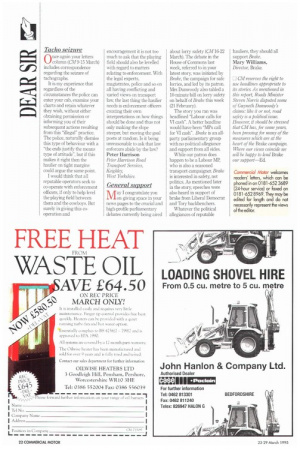O nce again your letters column (CM 9-15March) includes correspondence regarding the seizure of tachographs.
Page 34

If you've noticed an error in this article please click here to report it so we can fix it.
It is my experience that regardless of the circumstances the police can enter your cab, examine your charts and retain whatever they wish, without either obtaining permission or informing you of their subsequent actions resulting from this "illegal" practice. The police, naturally dismiss this type of behaviour with a "the ends justify the means type of attitude', but if this makes it right then the haulier on tight margins could argue the same point.
I would think that all reputable operators seek to CO-operate with enforcement officers, if only to help level the playing field between them and the cowboys. But surely in giving this cooperation and encouragement it is not too much to ask that the playing field should also be levelled with regard to matters relating to enforcement. With the legal experts, magistrates, police and so on all having conflicting and tariff, views on transport law, the last thing the haulier needs is enforcement officers creating their own interpretations on how things should be done and thus not only making the slope steeper, but moving the goal posts at random. Is it being unreasonable to ask that law enforcers abide by the law? Peter Harrison Peter Harrison Road Transport Services, Keighley, West Yorkshire.
May I congratulate you on giving space in your news pages to the crucial and high-profile parliamentary debates currently being aired
about lorry safety (CM16-22 March). The debate in the House of Commons last week, referred to in your latest story, was initiated by Brake, the campaign for safe lorries, and led by its patron. Mrs Ihinwf.x.)dy also tabled a 10-minute bill on lorry safety on behalf of Brake this week (21 February).
The story you ran was headlined "Labour calls for VI cash". A better headline would have been "MPs call for VI cash". Brake is an allparty parliamentary group with no political allegiance and support from all sides.
While our patron does happen to be a Labour MP, who is also a seasoned transport campaigner. Brake is interested in safety, not politics. As mentioned later in the story, speeches were also heard in support of brake from Liberal Democrat and Tory backbenchers.
Whatever the political allegiances of reputable II CM reserves the right to use headlines appropriate to its stories. As mentioned in this report, Roads Minister Steven Norris disputed some of Guyneth Dunwoody's claims: like it or not, road safety is a political issue. However, it should be stressed that CM has, for some years, been pressing for many of the measures which are at the heart of the Brake campaign. Where our views coincide we will be happy to lend Brake our support—Ed




































































































